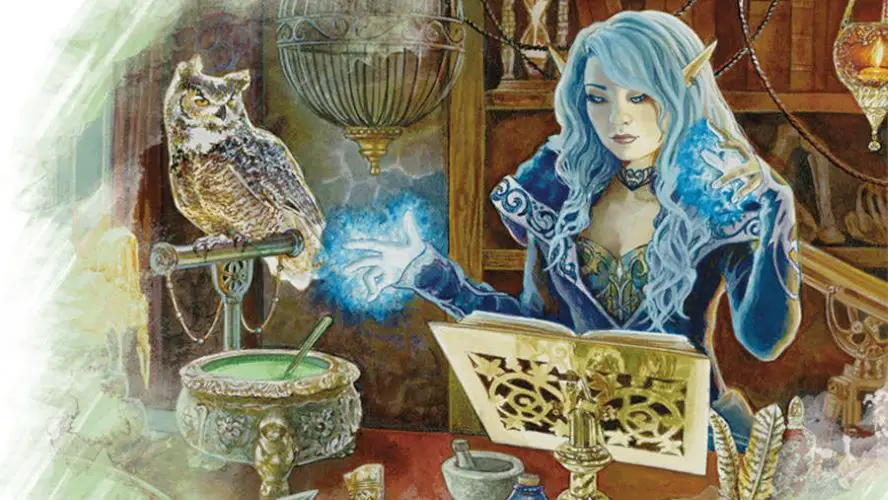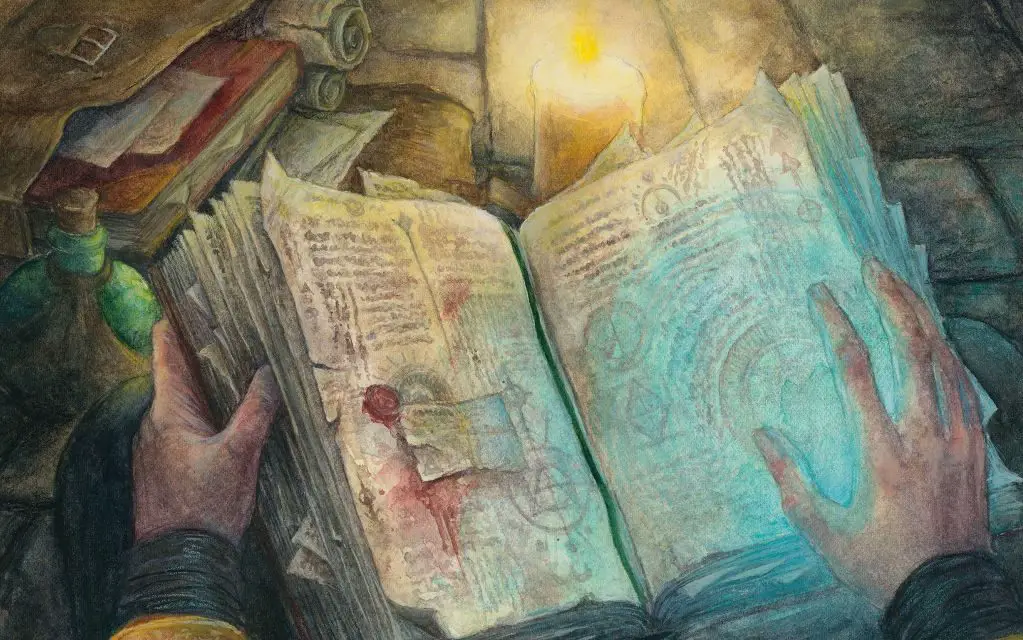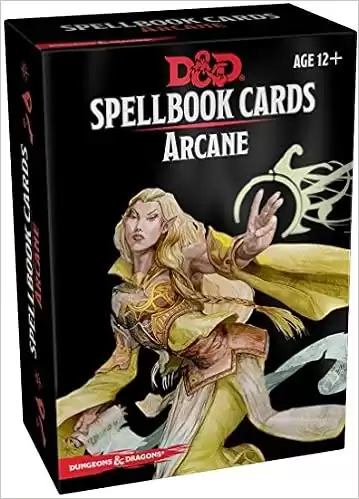Nothing is more important to the Wizard than their precious spellbook. It is, quite literally, the result of their life’s work of research and study!
Most Wizards would take any risk to protect or recover their spellbook if something happened to it.
But can you blame them?
In my years as a DM, I’ve found that the idea of using, maintaining, and managing a spellbook tends to scare a lot of players off from playing a Wizard.
I get it, though.
On the surface, it seems like a ton of confusing work which can seem intimidating.
This is especially true if you’re new to the game or haven’t played a spellcaster before. It’s a lot of new rules to have to take in!
But don’t worry, dear reader!
This is the full guide to Using and Managing the Wizard’s Spellbook in D&D 5e!
What is in the Wizard’s Spellbook?
The Wizard’s spellbook is their most important possession.
This tome contains all of their notes and research related to casting spells. This means that they have a dependable resource outlining things such as:
- The effect of a spell
- Material components needed for a spell
- Words or motions required to cast a spell
- Miscellaneous notes on magical topics
Naturally, the spellbook’s contents are mostly going to be related to casting spells. However, I’m personally fond of roleplaying a successful Arcana check as “oh! I took notes on that lecture! Let me see here…”
Wizards tend to be very intelligent, but even smart people can benefit from taking notes, after all!
In many cases, you can view a Wizard’s spellbook as their life’s work.
When the party takes a rest, the Wizard can most certainly be assumed to be making notes about what they’ve encountered or working on their spell research.
The only exception to this is cantrips, which Wizards easily remember and don’t need to have in their spellbook.

Adding Spells to Your Spellbook in D&D 5e
A level 1 Wizard’s spellbook contains six level 1 Wizard spells of your choice.
When you’re just starting out, this gives you plenty of options. However, you will naturally want to begin adding more spells to your collection.
As you level up, you’ll also be able to cast higher level spells.
If you are being diligent about keeping up with your studies and filling out your spellbook, you’ll be able to take full advantage of your power increases.
Generally speaking, you gain new spells in two ways: through leveling up and through copying them into your spellbook.
Let’s cover each of these.
Gaining Spells as you Level Up
The simplest way for Wizards to gain new spells is by leveling up.
Every time you gain a Wizard level, you gain two Wizard spells of your choice to add to your spellbook for free.
This is because of the assumption that your character is furthering their studies/research while the party rests.
Because of that, these level-ups can also be viewed as a kind of breakthrough in your research or learning.
Just keep in mind that these spells must be of a level for which you have spell slots to be able to cast!
Sorry, dear level 3 Wizard, the reality-shaping secrets of the Wish spell are still beyond your grasp…
…for now…

Copying Spells into Your Spellbook
Of course, you can’t just rely solely on the spells you gain from leveling up. Wizards need to be able to prepare the most helpful spells possible, which means you need options!
That’s where copying spells into your spellbook comes into play.
You might find new spells in a variety of places. Examples include:
- Another Wizard’s spellbook (friendly sharing or as loot from an enemy Wizard)
- Spell scrolls
- Arcane Libraries
- Merchants who specialize in arcane goods
Additionally, it might be possible to learn new spells by being tutored by another Wizard in your downtime. Though that’s up to your DM.
Just prepare to pay the cost of copying the spells you learn in addition to compensating your tutor for their time!
Which reminds me…
It takes time and resources to copy spells into your spellbook.
For each level of the spell, you have to spend 2 hours of time and 50gp.
This money covers the cost of materials (spell materials as well as special inks for transcribing) to copy the spell into your spellbook.
Here’s a table to help you out:
| Spell Level | Examples | Time Requirement to Copy | Cost to Copy |
| 1 | Burning Hands, Detect Magic, Magic Missile | 2 hours | 50 gp |
| 2 | Blur, Detect Thoughts, Misty Step | 4 hours | 100 gp |
| 3 | Counterspell, Fireball, Fly | 6 hours | 150 gp |
| 4 | Dimension Door, Polymorph, Wall of Fire | 8 hours | 200 gp |
| 5 | Animate Objects, Cone of Cold, Telekinesis | 10 hours | 250 gp |
| 6 | Chain Lightning, Create Undead, Wall of Force | 12 hours | 300 gp |
| 7 | Finger of Death, Reverse Gravity, Teleport | 14 hours | 350 gp |
| 8 | Clone, Dominate Monster, Sunburst | 16 hours | 400 gp |
| 9 | Power Word Kill, Time Stop, Wish | 18 hours | 450 gp |
While you’re copying the spell, you’re also practicing the techniques involved in casting it.
Once you have satisfied the time and cost requirements, it is successfully copied into your spellbook. From there, you can prepare it as you would any other spell.
Just remember that you can only copy spells of a level for which you can cast.
So, a level 2 Wizard who finds a scroll with the Suggestion spell wouldn’t be able to copy it into their spellbook yet.
However, when the Wizard hits level 3 (and can now cast level 2 spells), they’re then able to copy it into their spellbook to use later.

Preparing Spells
As a Wizard in D&D 5e, you prepare your spells by studying your spellbook during a long rest.
The number of spells that you can prepare for the day is determined by adding your Intelligence modifier and your Wizard level.
So, let’s say that Karb is a level 3 Wizard with an Intelligence score of 16. This gives him an Intelligence modifier of +3.
Adding his Wizard level and Intelligence modifier, Karb can prepare 6 spells for the day.
Let’s then say that Karb chooses to increase his Intelligence to 18 when he reaches level 4. This means that he now has an Intelligence modifier of +4.
Once again adding his Wizard level (4) and Intelligence modifier (4) together, Karb can now prepare 8 spells for the day.
Pretty easy, right?
Also, note that the number of spells you can prepare for the day will be different from your number of spell slots!
At level 4, Karb is able to prepare 8 spells for the day. However, he has a total of 7 spell slots (4 level 1 slots and 3 level 2 slots.)
He may only use those slots for a few spells, but he has 8 prepared.
You don’t have to commit your prepared spells. Instead, they’re spells that you’ve got ready just in case the situation for them comes up.
Related: The D&D 5e Ability Scores Explained
Spells Known vs Prepared Spells
Have you ever had a “cram session” the night before an important exam?
The point of doing this is so that you can look over the most important information that you need to know for the test.
When you do this, you aren’t trying to memorize the entire textbook! Instead, you’re making sure that the most important things that you expect to be on the test are at the front of your mind.
Now, when those questions come up on the test, you’ll be able to easily remember the answer.
That’s basically exactly what your Wizard is doing when they take a long rest!
When deciding which spells to prepare for the day, you want to think to yourself, “what is most likely to come up?”
You’ll certainly find yourself picking up more than a few reliable spells that permanently stay on your list of prepared spells. After all, it’s wise for any wizard to bring a mix of damage and utility spells!
So, your Wizard has committed this selection of “prepared” spells to memory. That way, they’ll have them ready even (or, especially!) when things get hectic.
While they still have their other spells in their spellbook, these prepared spells are what the Wizard has committed to for the day. When they take another long rest, they’ll be able to swap out their prepared spells.
Though there is one notable exception to this…
Ritual Spells
Some spells don’t necessarily require you to prepare them if you’re a Wizard. These are known as Ritual Spells and have a special “ritual tag” next to their names (or otherwise specified.)
By taking 10 minutes to cast the spell instead of the typical casting time, you are able to cast the spell without using a spell slot.
Furthermore, the spell only needs to be in your spellbook!
So, a spell like Identify (which provides some very important utility for determining magical effects) doesn’t need to take up space on your prepared spell list.
If you can make the time to cast it as a ritual, you only need to have the spell in your spellbook. This frees up space in your prepared spell list for something else!
Ritual Casting is incredibly important and will help you get more mileage out of your spell slots.
I recommend checking out my article that covers Ritual Casting in more detail!

Losing and Replacing Your Spellbook
So, what do you do if the unthinkable happens?
No, I’m not talking about something as trivial as your character dying. I’m talking about the true worst-case scenario: YOU LOSE YOUR SPELLBOOK!
After spending an appropriate amount of time crying underneath the table, it’s time to get to work. Once again, your spellbook is your single most important possession!
Obviously, you will want to make recovering your spellbook your top priority if you can.
For example, if it was taken by an enemy or fell into a dark chasm or something, you might be able to recover it. That said, you’ll be taking on that enemy or venturing into that dark chasm of peril to do so!
In the meantime, when you lose your spellbook, you only have the spells that you had prepared for that day.
While you’ve committed those to memory, you have now lost access to the other spells in your spellbook.
This means you won’t be able to change out your spells until you either get a new spellbook or recover your previous one.
Yeah… it’s pretty awful…
Starting a New Spellbook
So, let’s say that your spellbook is completely impossible to retrieve.
Perhaps it fell into lava, or maybe the RUDEST VILLAIN EVER decided to destroy it. Either way, the book is completely and hopelessly gone.
Your Wizard’s first order of business should be to acquire a new spellbook ASAP and begin writing down the spells that they already have prepared/memorized.
Be warned: this will take time and money.
The Player’s Handbook values a new spellbook at 50gp. You might potentially get a discount or replacement from a friendly Wizard, mentor, or merchant.
However, an opportunistic merchant might find out how desperate you are and gouge the price on you. So be careful who you let know that you lost your previous spellbook!
When you get your new spellbook, you’ll want to immediately begin writing down your prepared spells. Thankfully, this process is quicker and cheaper because you’ve already done this before.
Writing spells that you already know into your new spellbook takes 1 hour and 10gp per level of the spell.
| Spell Level | Time Requirement to Copy Known Spell | Cost to Copy Known Spell |
| 1 | 1 hours | 10 gp |
| 2 | 2 hours | 20 gp |
| 3 | 3 hours | 30 gp |
| 4 | 4 hours | 40 gp |
| 5 | 5 hours | 50 gp |
| 6 | 6 hours | 60 gp |
| 7 | 7 hours | 70 gp |
| 8 | 8 hours | 80 gp |
| 9 | 9 hours | 90 gp |
Making a Backup Copy of Your Spellbook
As you can see, Wizards are put into quite a pickle when they lose their spellbook. That’s why the cleverest Wizards know that it’s always wise to have a backup.
It’s not paranoia, it’s precaution!
The rules for making a backup copy of your spellbook work the same way as making a replacement, as we discussed above. Of course, the big difference is that you’re able to backup ALL of your spells instead of only the ones that you have prepared.
If you’ve got a secure place to keep your backup spellbook, this is well worth the investment of time and gold.
You hope you won’t need your backup book. But if that time comes, you’ll be glad you have it!
Even a high-level Wizard can be thrown into a panic if they suddenly find themselves without access to their precious spellbook!

Your Spellbook’s Appearance
Don’t ignore the extra impact that your spellbook’s appearance can have on your character.
This is a unique opportunity to bring elements of your character’s personality to life in a visual form! I mean, it’s very unlikely that your character is ever seen without their spellbook on their person!
For example, your Wizard might be a meticulous academic like Hermione Granger from the Harry Potter series.
Such a character would likely have a spellbook that is well taken care of and is likely perfectly indexed. Colored tabs might clearly indicate which section of the book is for what.
But maybe your Wizard tends to be a kind of “absent-minded professor” type. They’re smart but have a habit of being sloppy or easily distracted.
In this case, the spellbook might be stuffed with loose notes and bits of parchment.
Some of these loose papers might be napkins with brilliant ideas scribbled on them, while others are things like receipts from trivial purchases 5 years ago.
(No, I’m not referencing myself here. I have no idea what you mean. Why do you ask?)
And even then, your Wizard’s spellbook’s appearance might be determined by your preferred school of magic!
Some examples:
| School | Book Appearance |
| Abjuration | The book is in perfect condition and stays that way. A glowing rune shines over the lock strap. Any bends or creases magically fix themselves, and any dirt/debris is immediately brushed off. |
| Conjuration | A cover with bent corners and a creased spine indicate a much-used tome. Many spells have been crossed out and rewritten as a result of new approaches to prevent previous mishaps from happening again. |
| Divination | At first appearance, the book’s cover and pages appear to be completely blank. Once the reader settles in and is ready to read, the words and previous notes seem to write themselves out. |
| Enchantment | When opened, the book’s pages have a light, calm, and relaxing fragrance. It’s hard to explain why, but writing in this book just feels better than others. |
| Evocation | The “book” seems more like an erratic collection of notes shoved in a worn folio that seems to commonly mention explosions a concerning number of times. Notes appear to be written in a “stream of consciousness” style. |
| Illusion | The book appears to be something entirely different such as a childrens’ storybook or a restaurant menu until you look closer. |
| Necromancy | This spellbook appears to be made of possibly-humanoid flesh that is stitched together. We really hope it’s only cosmetic and not real. |
| Transmutation | A hefty tome that reads like a university-level physics textbook. It is full of intricate diagrams and calculations. Curiously, the diagram on the cover seems to slightly change every time you look at it. |
Can You Wear Your Spellbook?
Speaking of the fear of losing one’s spellbook and the fun of deciding what it looks like, we’ve arrived at the eternal question…
Can you wear your spellbook?
Ok, so I suppose you could theoretically fashion your pages of notes into a stylish jacket or something. I haven’t seen that done before but go for it if that’s what you want.

What I’m specifically talking about is the idea of a Wizard getting their spells tattooed onto their own flesh.
In theory, the only way you’d lose a spell is if an enemy hacked off your fireball arm or something. But even then, there are ways to deal with that.
Personally, I don’t mind this idea and think it can make for an interesting aspect of the character.
However, there are a few considerations to do this:
- Where are the tattoos going? You’d still want to be able to see them.
- Which spells? You only have so much space on your body, so you might want to only prioritize the most important ones.
- What will you do if you lose a limb or take damage and scar up a certain spell tattoo?
- Who is tattooing you? They would need to be VERY skilled in copying the precise notes from your spellbook. (This likely won’t be cheap.)
There are pros and cons to the idea of your Wizard getting their spells tattooed on them.
However, this does present an interesting addition to the character. In my opinion, it can be encouraged if it contributes to the character, worldbuilding, and immersion.
You could likely follow similar rules to those covered by Magic Tattoos.

The Wizard Player’s Secret Weapon
The thing that most Wizard players tend to find overwhelming is sorting, selecting, and managing the spells in their spellbook. It’s not so bad at the earliest levels, but it can quickly become a bit of a burden.
This is especially true if your DM is good at giving you plenty of opportunities to scavenge spells scrolls or other casters’ spellbooks.
To that end, I STRONGLY advise Wizard players (or any spellcaster, really) to grab a deck of spell cards and a character folio.
The folios themselves are worth their weight in gold. I love them so much that I keep several handy to hand out to new players in my groups. You can read my review of the folios here.
But the folios specifically work with the spell cards and have designated pocket sheets for you to easily organize them.
Playing a Wizard well relies on proper preparation.
The problem is that many parties are ready to get up and start marching immediately after a rest.
This leaves you, as the Wizard, fumbling through your notes and books and trying to make sure you’ve got the best spells prepared.
Not only do the spell cards make it quick and easy to look up spell effects/requirements, but they’re also great for distinguishing which spells are in your spellbook and which you have prepared.
I played a Wizard before I got these and constantly felt overwhelmed. Trust me, they make a COLOSSAL difference in your wizarding experience!
Effortlessly organize your character info and spell cards. Use dry-erase markers for infinite reusability!
Make spell selection and preparation a breeze with these durable and efficient spellbook cards. Spend more time actually playing your game and less time flipping through books!
FAQs – Using and Managing the Wizard’s Spellbook in D&D 5e
As we wrap up this article on using and managing the Wizard’s spellbook in D&D 5e, I want to answer some frequently asked questions.
This is a complicated topic, but I hope this article has been able to answer your questions.
If you are still confused about something or have a question about your spellbook, feel free to reach out in the comments. I’m always happy to help!
Do Wizards Start with a Spellbook?
Yes. A level 1 Wizard starts with a spellbook and six level 1 Wizard spells of their choice.
How Many Spells Can a Wizard Add to Their Spellbook?
According to the PHB, a spellbook has 100 pages.
Given their technical nature, it’s not unreasonable to expect an average of one full page per spell. As such, a Wizard can have 100 spells in a spellbook before requiring another book.
However, I’ve never seen or heard of this being enforced at any table. So it could also be a judgment call for your DM.
Can a Wizard Learn a Cantrip from a Spellbook?
No. Cantrips are memorized by Wizards and generally are not written into spellbooks.

Can Anyone Use the Wizard’s Spellbook?
This gets a bit complicated…
Let’s say that Karb the Wizard allows Lucine the Druid to look at his spellbook. After all, she’s curious about the differences between Karb’s Arcane magic and her own Divine magic.
Lucine can certainly read some of the entries in Karb’s spellbook. It’s just like how she can read spell scrolls with spells that are on the Druid list whether or not she actually knows them.
So Lucine can recognize spells like Fog Cloud or Scrying that Druids and Wizards have in common.
If it’s something like Hypnotic Pattern, which is not on the Druid spell list, Lucine (who is proficient in the Arcana skill) might make an Intelligence (Arcana) check to figure out what the spell is.
But even if Lucine does well on that, it doesn’t mean that she can fully understand or cast it.
Consider…
If you are not a theoretical physicist, you might be able to recognize words and put together certain meanings in a high-level physics journal.
But that’s not the same as someone who IS a theoretical physicist and UNDERSTANDS what is being communicated in that journal.
To use another example, it’s like learning Portuguese for a few months so that you understand the basics of the language.
Sure, you can use context to figure some things out. However, you will still struggle if you immediately fly to Brazil and try to have anything more than a basic conversation with a local.
Any conversation that goes beyond “Hello, how are you?” and “the cat is on the chair” will likely only result in confusion for everyone involved.
So, while anyone can, in theory, potentially read the Wizard’s spellbook. Only a Wizard has the research and knowledge to actually understand and USE it.
Sorry, dear Rogue, no fireball for you.

What Spells Can Wizards Cast Without a Spellbook?
Without a spellbook, Wizards can cast cantrips and the spells that they have prepared.
If you lose your spellbook, the only spells you have available to you are the ones that you last prepared.
Do Wizards Need to Hold Their Spellbook in Combat?
No. Wizards do not need to have their spellbook out in combat.
The spellbook is only used for recording new spells, preparing spells, and casting ritual spells.
Can a Wizard Use 2 Spellbooks?
There is nothing (besides carrying capacity) preventing a Wizard from using multiple spellbooks.
A Wizard who is particularly rigid with how they index their spells might have dedicated and specific tomes for various occasions or schools of magic.
When preparing their spells, they often sort through their collection of books to pick the best ones for the adventuring day ahead.
You might also have recently found a spellbook as loot on your journey. Until you choose to copy the spells from that book into your primary spellbook, nothing stops you from preparing your spells from that book as well.
Does a Wizard with Keen Mind Need a Spellbook?
This is a sticky one with scents of munchkin-ism to it, so I’ll try to keep it brief.
The assumption here is that Keen Mind’s benefit of allowing you to “accurately recall anything you have seen or heard within the past month” allows you to get around needing a spellbook.
In theory, you should only have to read your entire spellbook once a month to remember everything that is in it, right?
As it just so happens, yes. You can recall all of that information.
But preparing your spells is more than simply recalling information. It’s practicing the spell’s gestures, memorizing the incantations, and actively studying the spell.
The mystical component to this process isn’t captured by Keen Mind. The end result is more than the sum of its parts!
And, of course, we can also look at 5e Rules Designer, Jeremy Crawford’s, take on Twitter.
The Keen Mind feat isn't meant to change how a wizard's spell preparation works. #DnD https://t.co/6fANl74HFs
— Jeremy Crawford (@JeremyECrawford) November 12, 2015
But that’s just my take. As always, it’s ultimately the DMs call for your game.
Conclusion – Using and Managing the Wizard’s Spellbook in D&D 5e
Okay, so this was definitely a long one with a lot to cover. But I appreciate you sticking around and I hope you’ve found this guide helpful.
Knowing how to properly use and manage your spellbook is the single most important thing to playing a Wizard. It can be intimidating at first, but if you follow these tips, you’ll be in good shape!
Got questions about the Wizard’s spellbook? Let’s chat in the comments!











